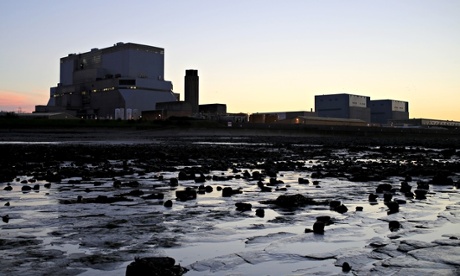
The timetable surrounding the construction of Britain’s first new atomic reactors in almost 30 years has once again been blown off course, its developer, EDF Energy, has admitted. The setback came as the French-owned generator and supply company reported a 25% slump in operating profits for 2014 to £863m, which it blamed on challenging market conditions.
EDF had originally promised to tie up a new deal with financial backers and then take a final investment decision on the proposed new plant at Hinkley Point in Somerset by the middle of last year. This date was later revised to March 2015.
But in a new statement, the largely state-owned energy group said a final investment decision might only be possible in a matter of months, and it had still not finalised talks with Chinese financial backers.
Jean-Bernard Lévy, the head of EDF group in France, played down the problems. “Hinkley Point C is a major project, one of the biggest construction projects in Europe. The final investment decision is an objective which we will have to analyse rapidly. We need to be in a place where we can make this investment, but negotiations are still ongoing and I can therefore not say more on this subject.”
Industry insiders believed EDF had set aside a provisional target of June due to an array of uncertainties involving the the UK government, China and Austria.
Delays threaten Britain’s attempts to reduce the scope for any power supply crunch, meet its carbon reduction targets and encourage other potential nuclear developers such as Toshiba of Japan to speed up investment. The problems with the UK government surround the final wording of a “contract for difference” contract under which energy consumers will effectively guarantee long-term prices for EDF. The forthcoming general election is said to be slowing down momentum inside Whitehall departments to sign off the highly complex legal documents.
Meanwhile, there is growing speculation that Chinese investors are hardening the terms under which they would be willing to help underwrite some of the cost of the new plant. China National Nuclear Corporation and China General Nuclear Power Corporation are expected to be minority shareholders in the project, but are also pushing for commitments to build and operate their own plant at Bradwell in Essex.
EDF has declined to confirm that it too is trying to limit the financial damage through compensation from the UK government should there be a successful legal challenge in the European courts by Austria to the UK subsidy arrangement.
Critics of the £24.5bn nuclear programme in Somerset have highlighted the industry’s poor track record for constructing facilities on time and on budget. They have questioned whether Hinkley Point C reactors would able to meet their timetable of opening for operations in 2023.
EDF has already run into problems with a new project at Flamanville in Normandy, while another project in Finland, the European pressurised reactor, which uses the same design as Hinkley, is also massively behind its original timetable.
Financial problems at its French design partner, Areva, have not helped the sense of uncertainty surrounding EDF’s nuclear ambitions, while EDF was forced to suspend operations at two British plants last year because of potential technical faults. The temporary outages at Heysham 1 and Hartlepool nuclear power stations helped tarnish EDF Energy’s 2014 financial results, it said, but the figures were also hit by a £136m charge related to the value of the company’s gas generating and storage assets.
Despite these problems, the boss of EDF Energy, Vincent de Rivaz, said there were many positive aspects to celebrate, not least an additional 194,000 customer accounts at a time when many of the big six suppliers were losing ground. “Despite challenging market conditions, EDF Energy increased its investment in the UK. Customers will benefit from this long-term approach with more low-carbon electricity for the future,” he said.
“Our spending on research and development has underpinned our ability to safely extend the lives of our nuclear power stations. At the same time, customers are seeing very competitive prices, with an increasing number benefiting from our fixed tariffs.”

